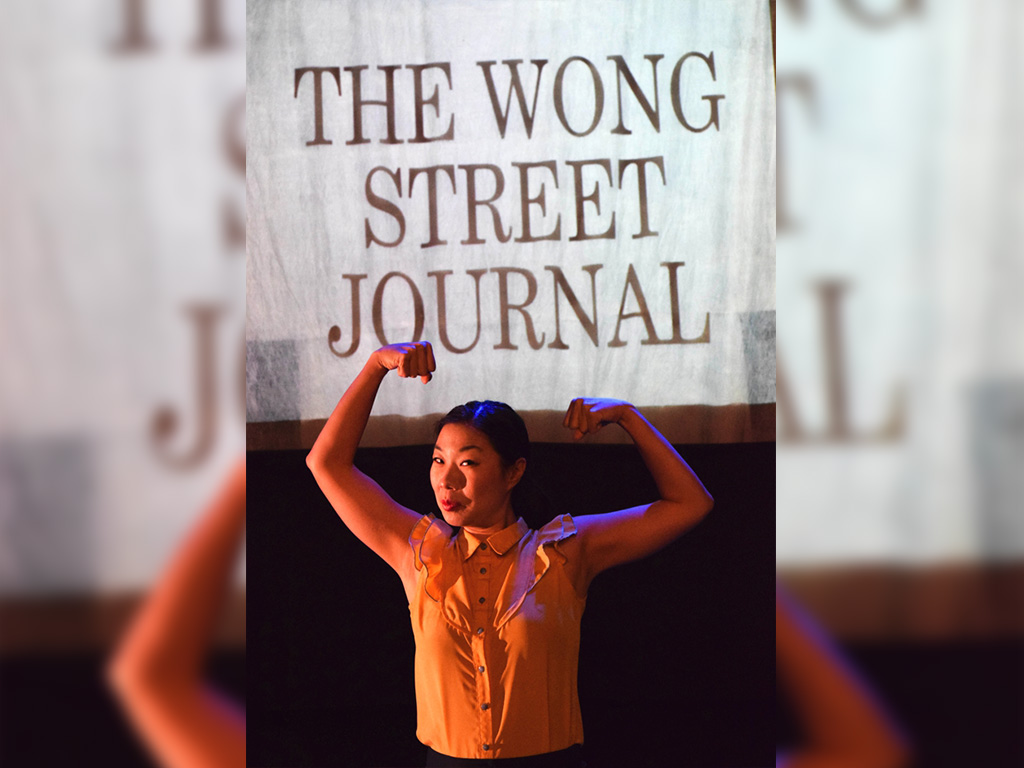
Performance artist, comedian and writer Kristina Wong performed her solo theater show “The Wong Street Journal” as part of the Bootleg Theater’s first Solo Queens Fest, a solo performance festival featuring local female artists in Los Angeles that ran from Oct. 26 to Nov. 19. Emily Mendelssohn — a Brooklyn based object theater director — directed the performance, in which Wong recounted her trip to Northern Uganda. Wong set the show against the backdrop of a fabric version of the New York Stock Exchange which she sewed herself. In her performance, Wong explored the complexities of privilege, poverty and economic theory using spoken word, dance, slideshows, felt charts and rap music. “The Wong Street Journal” originally premiered in San Francisco in June 2015.
Wong said in her performance that she traveled to Northern Uganda for three weeks in 2013 as a volunteer with Volunteer Action Network (vac-net), a nonprofit that provides microloans for women to start their own businesses. Wong explained that as she prepared for her trip, she, like most Americans, was ill-informed about the socio-economic and social environment in Africa.

“I didn’t know very much about the continent other than what I saw on TV. Most of us are informed by charities we are a part of or celebrities who have adopted a baby there,” Wong said.
Throughout the show, Wong discussed her need to post about her activism on social media. During the performance, Wong threw red felt hashtags at the audience. She explained that these represented a live hashtag war. Wong said she is guilty of being an armchair activist — someone who does their activism from the comfort of their home and phone. She said that the majority of her show revolves around the problems with that mentality.
“It’s a lot trickier than just calling somebody out,” Wong said. “There’s still real people in front of me day today, I’m still living in a town, at least for those three weeks, with real people who are not symbols of poverty, who are not just data points; these are real human beings.”

Wong explained in her show that she also recorded a rap album titled “Mzungu Price” with local rapper and music producer Nerio Badman while she was in Uganda, which according to Wong, is still played in nightclubs and on the radio. Although she is Chinese American, Wong said during the show how the lyrics label her as representing Europeans; the locals called her mzungu — a Ugandan term used to describe white people and foreigners.
Wong noted that she changed her show’s premise to detangle her relationship with privilege in Uganda.
“I couldn’t do a show about microloans or the politics of economics without addressing what it meant for me as an Asian-American woman who in America is usually the marginalized voice, the one who’s always fighting for my seat at the table, to being the oppressor in the room, the powerful person,” Wong said.

Professor Ricardo Salinas in the theater department teaches a class at Occidental titled “Comedy and Social Change.” Salinas is part of the social commentary performance troupe Culture Clash and has the same booking agent, Circuit Network, as Wong. Salinas said that he is a fan of the subversive aspects of Wong’s work and enjoys seeing how Wong uses her performances to inspire social change
“She has such a unique voice that she rather shocks an audience a lot, because she doesn’t hold back, and at the same time she entertains because it is so funny,” Salinas said.
Madison Taggart (first year) said that she enjoyed the show and found Wong’s storytelling compelling.
“When somebody talks about something that’s really personal, the more personal it is, the more interesting it is,” Taggart said. “Even if it’s something very specific, I think you can relate to it in some small way or another.”

After being on tour with “The Wong Street Journal” for two years, Wong said that she felt it was time to start working on new pieces.
“I think, unfortunately, after the last election, [“The Wong Street Journal”] feels like a very Obama-era piece. We used to have time to worry about saving the rest of the world.” Wong said.
Salinas said that work from fellow artists of color is important in such a divisive political climate.
“She does it for the love of trying to make us included,” Salinas said. “It’s about inclusion because you know as people of color we are feeling so marginalized, we’re feeling like we’re not American and yet she is so American.”
![]()



































